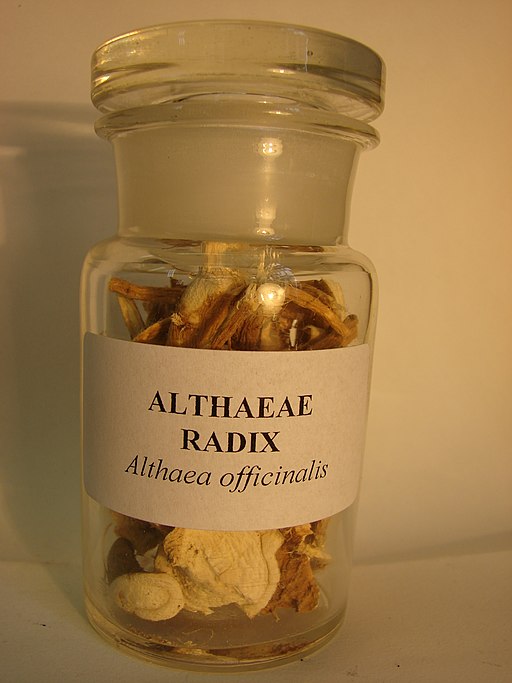
A reader of the blog asked me for my opinion about marshmallow tea, and if it presented any health benefits or risks. I was intrigued, as my marshmallow knowledge is limited to bonfire roasting. They sent me a link to “7 Unbelievable Things Marshmallow Root Can Do To Your Body” which is a YouTube video that is long on excitement and the use of the word “may”. The video describes the common benefits that are attributed to marshmallow root including digestion/gastrointestinal benefits, pain relief, use for coughs and colds, wound healing/skin benefits, and general use as an antioxidant. Like most posts it’s short on references, so I took a closer look.
What is marshmallow root?
I quickly learned that the marshmallows you buy in bags have little to do with the perennial herb Althea officinalis. The plant is indigenous to Europe and Asia, and naturalized throughout North America. The edible leaves, flowers and roots of A. officinalis have been used in traditional herbal medicine for over 2,000 years. Primary uses have been based around mucilage, which is produced by the roots and leaves and forms a gummy substance when mixed with water. Usage for throat irritation and colds, based on its ability to coat the throat, is well documented historically.
The candy marshmallow has roots in an Egyptian candy made from marshmallow root and honey. Later French pharmacists made a meringue of marshmallow root, egg white and sugar. Eventually the marshmallow root was dropped and today’s candy contains no actual marshmallow root.
Does marshmallow root have medicinal uses?
The most common usage of marshmallow root is for oral/mucosal use. When you purchase the root, it is usually as an unpeeled, dried root. These roots contain polysaccharides, carbohydrates, other forms of sugars, and other components. However, it is the mucilage properties that are thought to provide the medicinal effects.
There is limited (in-vitro and animal) research into potential anti-inflammatory effects of marshmallow root. Laboratory studies have found that marshmallow root may stimulate cytokine release, interleukin-6, and tumor necrosis factor, but how that translates into actual medicinal effects is unclear. Animal studies suggest anti-inflammatory properties, but again, whether or not this can be translated into benefits in humans is unclear. There are no in-human trials that show any effects.
There is also limited evidence to suggest that marshmallow root has antimicrobial effects. Yes there is laboratory research and some animal research showing antimicrobial activity. Animal wound models seem to show beneficial effects, but how or if that is relevant to humans is unclear. Again, there are no human studies from which we could draw some conclusions about possible benefit.
Marshmallow root has also been studied in children with eczema. In this population, we want to avoid (or minimize) the use of drugs with side effects, like corticosteroids. A small trial showed a 1% ointment had some benefit compared to a hydrocortisone ointment. However, most of the patients that dropped out of the study were in the marshmallow group, making it difficult to draw conclusions. Unfortunately there have been no further trials.
The best researched use of marshmallow root is for its effects on cough. The European Medicines Agency has published an evidence review, noting that marshmallow root preparations can be used to treat irritation of the mouth or throat and associated cough, as well as mild discomfort of the stomach. It made this conclusion not on the basis of clinical trials but based on “traditional use” of the product combined with plausibility. The agency noted that it actually did identify two poor-quality trials: one was a clinical trials in 900 children with mouth/throat irritation and cough. While the product reduce coughing, there was no comparison group. The second trial in 63 adults concluded that marshmallow root drops reduced cough vs. placebo, but the active treatment product was insufficiently described. Neither trial factored into its evaluation. I also identified a small trial in patients with cough due to ACE inhibitors, drugs commonly used to treat high blood pressure. Cough is a common side-effect of ACE inhibitor treatment, and marshmallow root drops were found to be helpful, but the lack of a placebo control group makes any conclusions difficult.
While there have been no formal evaluations of safety, marshmallow root is thought to be safe when used orally and topically. Because of its mucilage effects it could conceivably affect the absorption of other drugs, so it may be advisable to separate consumption of medication from consumption of marshmallow root by an hour or so.
Conclusion: A tea alternative, but don’t expect miracles
Based on its chemical components, marshmallow root has some interesting, though not unique, pharmacological properties. From an evidence-based perspective, there is little to suggest that the product is harmful when consumed, and it may have some effects that are felt to be helpful. Marshmallow root is reported to have an “earthy” taste that some websites describe as “bland” and others warn it may take some time to get use to. Consuming the root (e.g. as a tea) is a reasonable option for those that want to self-medicate, particularly for those interested in a product for a sore throat or upset stomach. However, beyond that there’s little to suggest that the product has other medicinal benefits.

